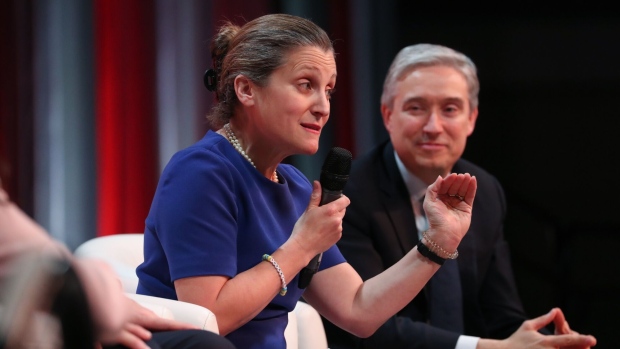Oct 5, 2023
Trudeau’s Government Launches Plan to Stabilize Canada’s Food Prices
, Bloomberg News

(Bloomberg) -- Prime Minister Justin Trudeau’s government outlined the first steps of a plan to stabilize food prices as Canadians continue to hammer his Liberal Party in the polls over the high cost of living.
Industry Minister Francois-Philippe Champagne and Finance Minister Chrystia Freeland provided details on Thursday, several weeks after meeting with executives of grocery stores and food manufacturers.
Champagne said the top five grocery chains — Walmart Inc., Loblaw Cos., Metro Inc., Empire Co. and Costco Wholesale Corp. — have agreed to support efforts to restore price stability to store shelves. Shares of the Canadian grocers showed little immediate reaction to the news.
Canadians can expect to “soon” see aggressive discounts across a basket of key food products for most households, as well as price freezes and price-matching campaigns, he said.
“Bottom line, we’re going to hold their feet to the fire,” Champagne said.
Trudeau announced last month that his government would demand grocery-store executives restore price stability as part of a suite of measures aimed at making life more affordable. The skyrocketing cost of food and housing in Canada has plunged the prime minister’s popularity to career lows in many polls.
Trudeau has decried grocers for making “record profits” while Canadians struggle to put food on the table, pushing food-bank use to new heights.
Grocery inflation slowed to 6.9% in August compared with 8.5% in July, but it still outpaced headline inflation of 4%.
If the government doesn’t see results from grocers and food manufacturers, it will take additional action including potentially imposing a tax on grocers, the ministers warned on Thursday. “No measures are off the table,” Freeland said.
Champagne rejected criticism from industry observers who say food inflation is expected to slow in coming months regardless of his government’s efforts, and that many grocers typically freeze prices over the winter holiday season, refusing to accept price hikes from suppliers during a crucial shopping period.
The minister said each of the five major grocers provided him with individual plans to stabilize prices and those initiatives will have an impact. “If you look at the measures they’re looking to take, for example a basket of discounted goods, the extent of that and the scope of it is more than what we have seen in Canada.”
The grocers will also be forced to compete with each other as their plans roll out and they see lower prices elsewhere, he said. “What we have been able to create in Canada is a competitive pressure that did not exist before.”
Keeping food prices as low as possible has been the top priority for Canada’s grocers since inflation surged at the end of the pandemic, said Michelle Wasylyshen, spokesperson for the Retail Council of Canada, in a statement.
Canada’s food inflation is lower than that of many other developed countries including the UK, Australia and France, and should fall further in coming months as input costs start to ease. Between 70% and 80% of checkout prices are determined before the food hits the shelves, she said. “It therefore remains critical that all members of the complex supply chain address their respective roles in food pricing.”
Champagne has said he also met with food manufacturers, including Nestle and Kraft Heinz Co., and urged them to play a role in slowing food inflation.
He also announced Thursday that the government will strengthen the Office of Consumer Affairs by creating a Grocery Task Force, which will monitor the grocers and manufacturers on a monthly basis and investigate practices such as “shrinkflation,” in which the price of an item remains stable but the weight or size gets smaller.
The government will also speed up industry-led work to establish a Grocery Code of Conduct to support fairness and transparency across the sector, as well as create a data hub for food price information including the cost breakdown throughout the supply chain, he said.
Trudeau’s government has also introduced a bill to amend the Competition Act in an effort to boost competition in the grocery sector, though the changes will affect all industries.
The government is also facing pressure to reduce its fiscal footprint, and to that end, Treasury Board President Anita Anand announced new guidelines for public sector managers who contract out professional services.
(Adds more detail from news conference, comment from Retail Council of Canada.)
©2023 Bloomberg L.P.


